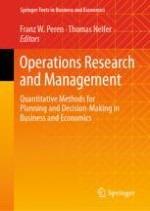This textbook introduces quantitative methods in operations management, based on operational research. Written for undergraduate and graduate students as well as practitioners, this book serves as a valuable compendium of essential tools for project planning, control, and strategic decision-making.
Drawing from the expertise of both experienced scientists and seasoned practical managers, the descriptions of each tool are a harmonious blend of theoretical insights and real-world applicability. With a focus on accessibility, the authors have thoughtfully combined abstract concepts with easy-to-follow examples and detailed case studies.
Readers will benefit from the abundance of well-explained recommendations and practical problem-solving approaches, where the book offers guidance on how to solve presented issues by using commercial software. Whether one seeks to refine project management, optimize operations, or make strategic choices, this book equips readers with the knowledge and proficiency required to excel in the dynamic field of operations management.
